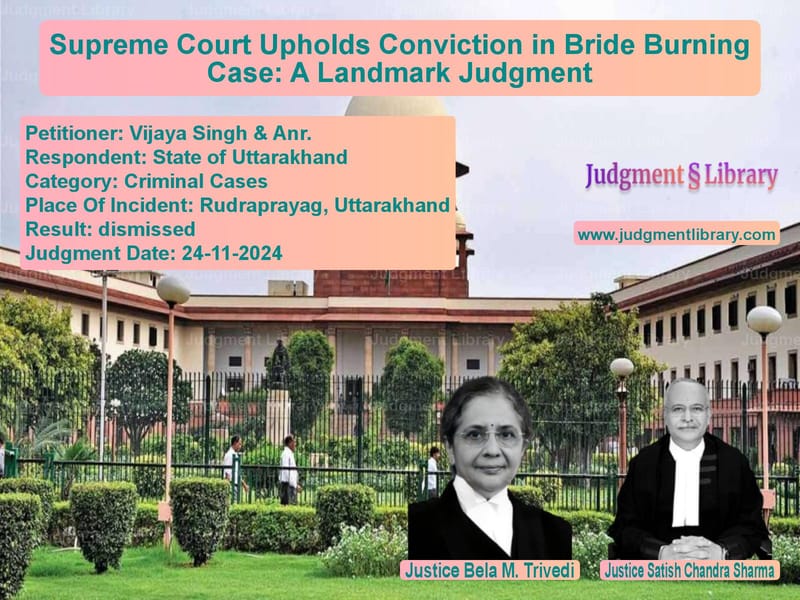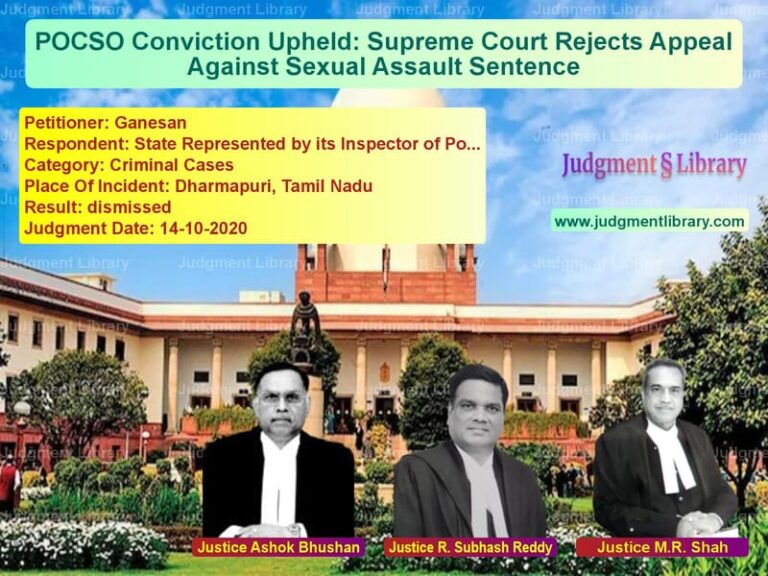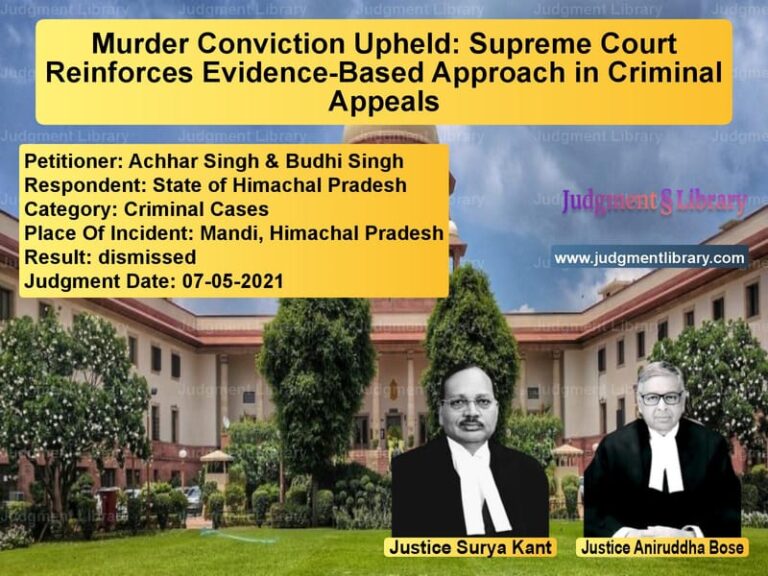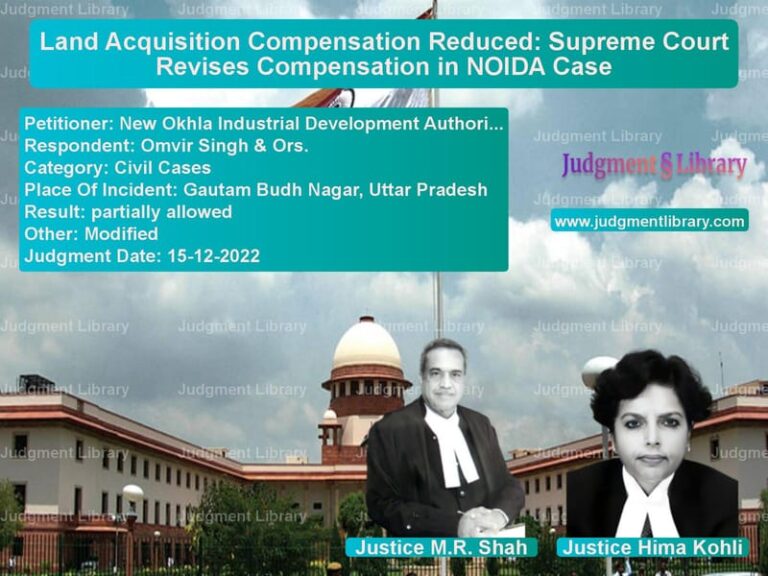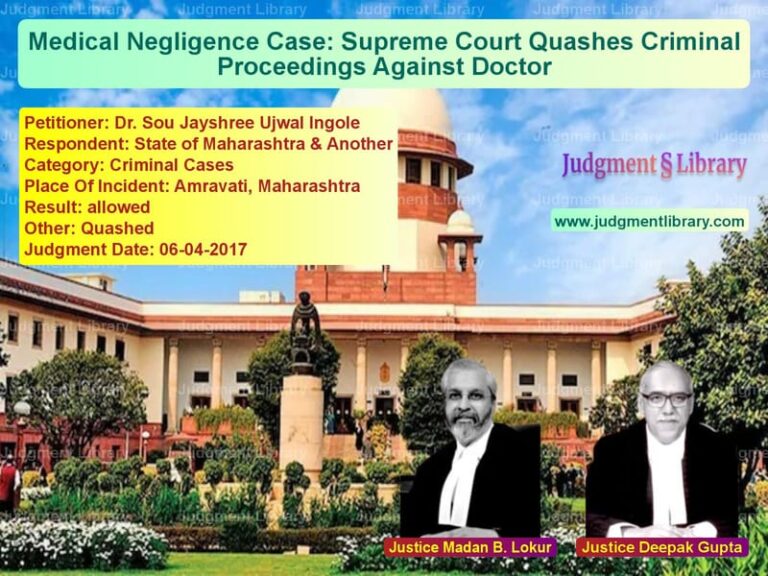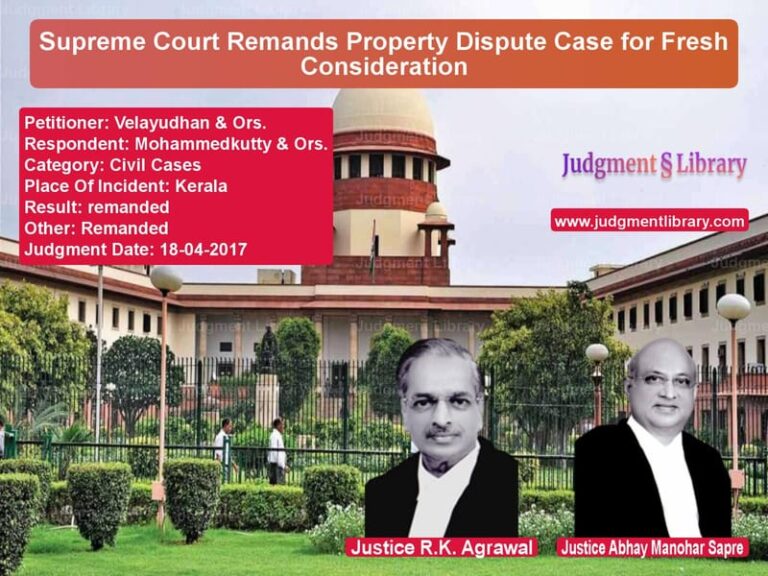Supreme Court Upholds Conviction in Bride Burning Case: A Landmark Judgment
The Supreme Court of India recently ruled on a significant case involving the tragic death of a young bride, Devaki, within 17 months of her marriage. The case, Vijaya Singh & Anr. vs. State of Uttarakhand, addressed issues of circumstantial evidence, dowry-related violence, and judicial scrutiny in cases of alleged domestic abuse leading to unnatural deaths.
Background of the Case
Devaki was married to Vijaya Singh in April 2002. On September 14, 2003, she was found dead in her matrimonial home under suspicious circumstances, suffering 100% burn injuries. The incident was initially reported as suicide, but her family suspected foul play. Devaki’s brother, Shankar Singh, filed an FIR against her husband, mother-in-law, and father-in-law, leading to an investigation.
Legal Issues Before the Court
- Whether the prosecution had established a complete chain of circumstantial evidence proving the guilt of the accused.
- Whether witness testimonies, especially statements recorded under Section 164 CrPC, could be relied upon when some witnesses retracted their statements.
- Whether the cause of death was suicide or homicide.
- Whether the defense of alibi claimed by one of the accused was valid.
Arguments by the Petitioner (Accused)
The defense argued:
- The delay in filing the FIR indicated that the case was fabricated.
- There was no prior history of harassment or cruelty, and prosecution witnesses contradicted each other.
- Devaki was depressed because she was not allowed to accompany her husband to Chandigarh, and this led her to commit suicide.
- The statements of key witnesses were unreliable, as they had retracted their testimonies.
Arguments by the Respondent (State of Uttarakhand)
The prosecution contended:
- The victim had repeatedly expressed her distress over the ill-treatment by her mother-in-law.
- The post-mortem report showed 100% burns, which is highly unusual in cases of self-immolation.
- The accused had fresh injury marks, indicating physical struggle.
- There were deliberate attempts to alter the crime scene, such as putting green grass over the victim’s body.
Supreme Court’s Observations
The Court examined the evidence in detail and made several critical observations:
1. Circumstantial Evidence Must Form a Complete Chain
The Court reiterated the five essential principles of circumstantial evidence laid down in Sharad Birdhichand Sarda v. State of Maharashtra:
“The circumstances from which the conclusion of guilt is to be drawn should be fully established. The facts must be consistent only with the hypothesis of the guilt of the accused.”
2. Witness Statements Under Section 164 CrPC
The Court emphasized that statements given before a magistrate under Section 164 CrPC hold more credibility than police statements. It noted that even though some witnesses retracted their statements later, the initial depositions were voluntary and truthful.
3. Post-Mortem Report and 100% Burns
The medical evidence was a crucial factor in the judgment. The post-mortem report confirmed that sustaining 100% burns was highly unlikely in self-inflicted burns. The Court observed:
“The nature of burn injuries, the absence of cries for help, and the absence of kerosene smell strongly suggest that the victim was set ablaze.”
4. Delay in Filing the FIR
The Court rejected the argument that a delay in registering the FIR suggested fabrication. It held:
“A grieving family cannot be expected to immediately approach law enforcement. The delay in FIR does not dilute the prosecution’s case.”
5. Attempt to Destroy Evidence
The Court found the accused’s conduct suspicious. The scene of the crime had been tampered with—grass was placed over the body, and water was poured over the area. It concluded:
“Such actions are indicative of an attempt to mislead the investigation and conceal the true nature of the incident.”
Final Judgment
The Supreme Court upheld the conviction of Vijaya Singh and Basanti Devi under Section 302 IPC (murder) and Section 201 IPC (causing disappearance of evidence). The accused were sentenced to:
- Life imprisonment under Section 302 IPC.
- Two years of imprisonment and a fine under Section 201 IPC.
The Court dismissed the appeal, stating that there was no reason to interfere with the concurrent findings of the lower courts.
Impact of the Judgment
This judgment reinforces the legal principles concerning circumstantial evidence and the protection of victims of domestic violence. The key takeaways include:
- Strengthening Witness Testimonies: Statements recorded under Section 164 CrPC carry significant weight.
- Handling of Circumstantial Evidence: Courts must meticulously analyze circumstantial evidence to form an unbroken chain leading to the guilt of the accused.
- Seriousness of Domestic Violence Cases: The judgment highlights the judiciary’s commitment to addressing domestic abuse cases with stringent scrutiny.
By upholding the conviction, the Supreme Court has sent a strong message against domestic violence and bride burning, reinforcing that justice will be served even in cases relying on circumstantial evidence.
Petitioner Name: Vijaya Singh & Anr..Respondent Name: State of Uttarakhand.Judgment By: Justice Bela M. Trivedi, Justice Satish Chandra Sharma.Place Of Incident: Rudraprayag, Uttarakhand.Judgment Date: 24-11-2024.
Don’t miss out on the full details! Download the complete judgment in PDF format below and gain valuable insights instantly!
Download Judgment: vijaya-singh-&-anr.-vs-state-of-uttarakhand-supreme-court-of-india-judgment-dated-24-11-2024.pdf
Directly Download Judgment: Directly download this Judgment
See all petitions in Murder Cases
See all petitions in SC/ST Act Case
See all petitions in Custodial Deaths and Police Misconduct
See all petitions in Judgment by Bela M. Trivedi
See all petitions in Judgment by Satish Chandra Sharma
See all petitions in dismissed
See all petitions in supreme court of India judgments November 2024
See all petitions in 2024 judgments
See all posts in Criminal Cases Category
See all allowed petitions in Criminal Cases Category
See all Dismissed petitions in Criminal Cases Category
See all partially allowed petitions in Criminal Cases Category

